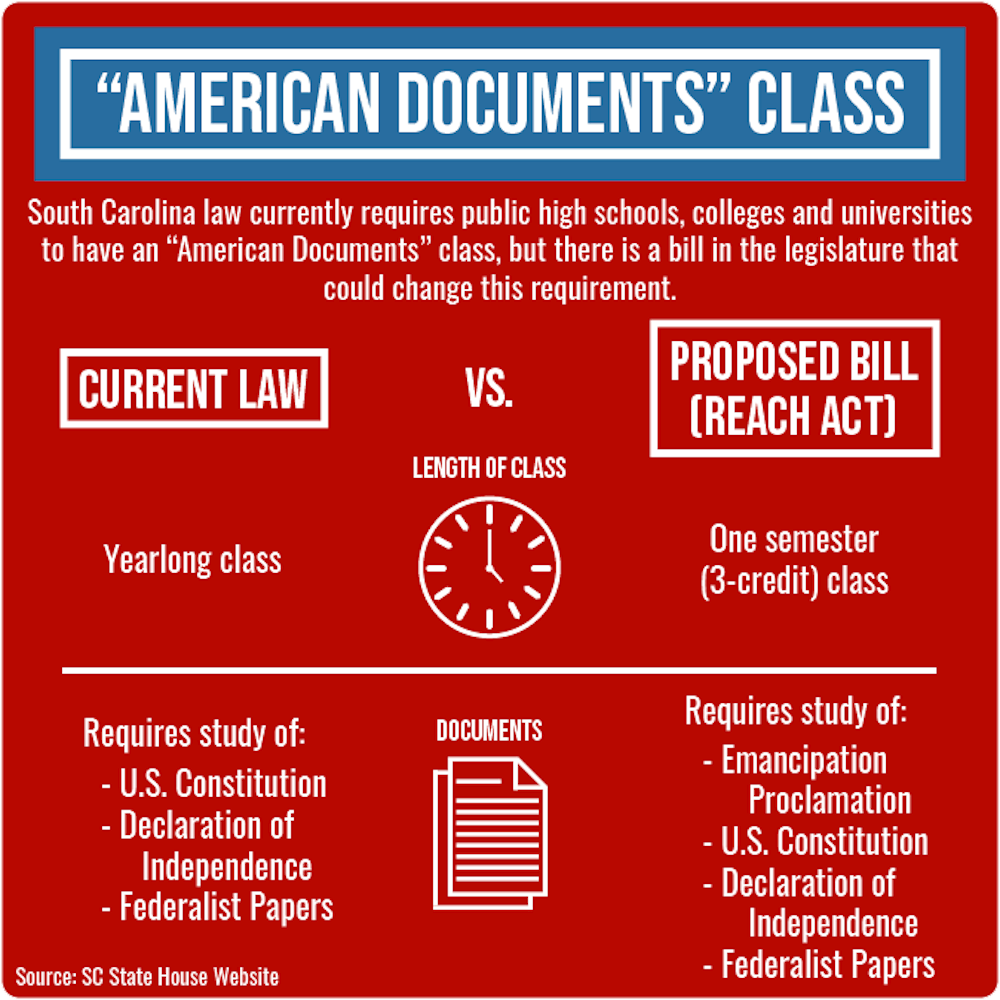A state education law requiring a yearlong American documents class could soon be amended by a bill being considered in the South Carolina General Assembly.
Section 59-29-120 of the South Carolina Title 59 requires public high schools, colleges and universities in the state to “give instruction in the essentials of the United States Constitution, the Declaration of Independence, and the Federalist Papers” for the length of one school year.
The law is not implemented by the University of South Carolina. While the Carolina Core requires all students to take one course in “Global Citizenship and Multicultural Understanding: Historical Thinking” before graduation, not all of the classes offered are focused on the history of the United States.
University of South Carolina professor of law and Ernest F. Hollings chair in constitutional law Derek Black said the law could be interpreted so as to argue that the university is already within compliance of the law.
“Well, there’s another way to look at this and say, ‘They previously passed it because they may have had it in high school,’” Black said. "That's another way to read this."
The law states that “no student in any such school, college, or university may receive a certificate of graduation without previously passing a satisfactory examination” over these documents.
Another portion of this law that has been called into question is the claim that passing one of these examinations will simultaneously satisfy “the examining power of his loyalty” to the United States.
The statute was originally implemented in 1962 when the Cold War and the Vietnam War had brought about a period of public distrust within the United States.
However, laws requiring citizens to take any type of loyalty oath have been ruled unconstitutional in the past, beginning with the Supreme Court of the United States ruling against such oaths in Cramp v. Board of Public Instruction in 1961.
“It’s unconstitutional to have loyalty requirements. The court has struck that down,” Black said.
The bill that could amend this law, introduced in January 2019, is called the Reinforcing College Education on America’s Constitutional Heritage (REACH) Act.
The amendment would shorten the requirement to one semester, or three credit hours, add the Emancipation Proclamation to the list of documents to be studied and eliminate the loyalty pledge requirement. The changes proposed in the REACH Act would make the law easier for universities to comply with and more comprehensive of the entire history of the nation.
The REACH Act also provides a fiscal impact summary, which shows the new bill will increase expenses for public colleges and universities. This increase could range from $1,185,000 to $3,935,000 in fiscal year 2019-2020 and from $1,130,000 to $3,880,000 each year after for universities combined, depending on how each university chooses to implement the requirement.
At the House Education and Public Works Committee hearing on Feb. 4, vice provost and dean of undergraduate studies Sandra Kelly said the university is in the process of adjusting the curriculum to comply with the REACH Act in a fiscally responsible manner.
In the proposed new curriculum, Kelly said, students would be able to choose from three different classes to fulfill the requirement, varying by the perspective through which the documents would be studied: a U.S. history perspective, a political science perspective and an African American history perspective.
Currently, the REACH Act has passed in the Senate and resides in the House full committee. It is unclear whether the REACH Act will make it to the ratification process this year, but if it is eventually signed into law by the governor, the bill is scheduled to take effect one year after being signed.
Second-year political science student Ian Grenier works as an intern at the Statehouse with the South Carolina Technical College System. He said he believes the required study of these documents at a deeper level is both important and beneficial to college students in the current political climate, as long as it is done correctly.
“If we’re going to teach one of those classes, it has to be a broad view of the entire American experience, and that certainly cannot be summed up in just four documents,” Grenier said.

